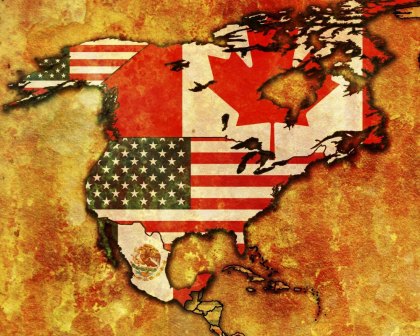
During a CNN debate March 6, Vermont Sen. Bernie Sanders accused former Secretary of State Hillary Clinton of backing the agreement, signed in 1992 and ratified in 1993. It was negotiated by administration of President George H.W. Bush along with Canadian and Mexican counterparts, but went into effect when Clinton's husband, Bill Clinton, was president.
“Secretary Clinton supported virtually every one of the disastrous trade agreements written by corporate America,” Sanders said. “NAFTA, supported by the secretary, cost us 800,000 jobs nationwide, tens of thousands of jobs in the Midwest. Permanent normal trade relations with China cost us millions of jobs. Look, I was on a picket line in early 1990s against NAFTA because you didn't need a Ph.D. in economics to understand that American workers should not be forced to compete against people in Mexico making 25 cents an hour.”
Hillary Clinton, who was first lady when NAFTA was approved, countered: “To set the record straight, I voted against the only multinational trade agreement that came before me when I was in the Senate. It was called CAFTA [Central America Free Trade Agreement].”
While both candidates assert that they are against these trade agreements, the exchange failed to connect the dots for viewers. For example: Has it been proven absolutely that NAFTA resulted in the loss of American jobs? Let’s unpack this:
What is NAFTA? The North American Free Trade Agreement was signed by Canada, Mexico, and the United States. It took effect on Jan. 1, 1994, according to the U.S. Department of Homeland Security. The agreement established a “free-trade zone” in North America. “NAFTA immediately lifted tariffs on the majority of goods produced by the signatory nations,” the website explains. The agreement called for removal of cross-border investment barriers during a 15-year period. As of Jan. 1, 2008, tariffs and quotas were eliminated on U.S. exports to Mexico and Canada under the agreement, recounts the Export.gov website. The Central American Free Trade Agreement (CAFTA), mentioned by Clinton, was a 2004 compact expanding NAFTA to include five Central American countries -- El Salvador, Guatemala, Honduras, Costa Rica, and Nicaragua. Other countries have since signed similar agreements.
Why was NAFTA controversial? In 1992, presidential candidate Ross Perot said this about a proposed trade deal:
“To those of you in the audience who are business people, pretty simple: If you're paying $12, $13, $14 an hour for factory workers and you can move your factory south of the border, pay a dollar an hour for labor, hire young -- let's assume you've been in business for a long time and you've got a mature work force -- pay a dollar an hour for your labor, have no health care -- that's the most expensive single element in making a car -- have no environmental controls, no pollution controls and no retirement, and you don't care about anything but making money, there will be a giant sucking sound going south.”
Were jobs lost as a direct result of NAFTA? Some economists feel it has done exactly that. Others disagree:
- In 2011, Robert E. Scott, senior economist and director of trade and manufacturing policy research at the Economic Policy Institute, wrote, “As of 2010, U.S. trade deficits with Mexico totaling $97.2 billion had displaced 682,900 U.S. jobs. Of those jobs, 116,400 are likely economy-wide job losses because they were displaced between 2007 and 2010, when the U.S. labor market was severely depressed. Prominent economists and U.S. government officials predicted that the North American Free Trade Agreement (NAFTA) would lead to growing trade surpluses with Mexico and that hundreds of thousands of jobs would be gained.” But surpluses in the wake of NAFTA did not materialize. The hardest-hit congressional districts, he wrote, “as a share of total employment, had large numbers of workers displaced by manufacturing trade, especially in autos, auto bodies and parts, and in computer and electronic parts production. Half of the top 20 hardest-hit districts were in Michigan, followed by four in California, three in Indiana, two in Ohio and one in Texas.”
- But here is another opinion: “Perhaps NAFTA accelerated the process, but it did not make a huge difference,” said Mauro Guillen a professor at the University of Pennsylvania’s Wharton School, quoted on the school’s website. “At the same time, a lot of jobs were created in the U.S. that wouldn’t be there without the Mexico trade. I’m not just talking about Texas or California or Arizona…. Many of the products made in Mexico are designed in the United States. So there are a lot of jobs created here.”
Sources:
- Encyclopedia Britannica.com: North American Free Trade Agreement.
- Economic Policy Institute: Heading South --U.S.-Mexico trade and job displacement after NAFTA.
- Export.gov:The North American Free Trade Agreement.
- The New York Times: The 1992 campaign -- Transcript of the 2nd TV debate between Bush, Clinton and Perot.
- Politifact: Clinton has changed on NAFTA.
- Transcript, CNN Democratic debate, Flint, Michigan, March 6, 2016.
- University of Pennsylvania: NAFTA, 20 years later -- do the benefits outweigh the costs?
- U.S. Customs and Border Protection: North American Free Trade Agreement.
Related:
What is the Glass-Steagall Act?
If you would like to comment give us a shout or like us on Facebookand tell us what you think.